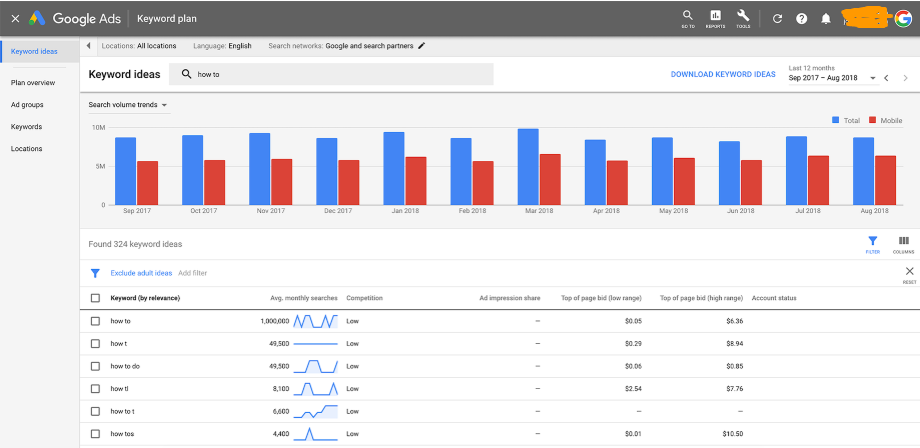Understanding your keywords is one of the fundamentals of SEO. If you can get a lot of mileage out of keyword research. Especially in the early days of your website, as you work to build web traffic and increase your rank. Before you look at other sources of WordPress web development, consider using free online tools to research keywords. In this overview, we will show you some of the best tools you can access right now.
Before we get started, let us do an overview of the importance of keywords and how they function. This way, you can use these free tools much more effectively.

The Value of Keywords:
Keywords help with organic discovery. They are essential to get picked up by the search engine algorithms. But beyond that, keywords will help you build your content and marketing campaigns.
A keyword gives you insight into what users are looking for. Knowing this may drive your content in one direction, or the other. You should not solely base your content around the use of keywords. You still need to create original, and natural-sounding work. But without paying attention to some keywords, it is difficult to almost impossible to stay competitive.
The same principles apply to your marketing strategies. Researching keywords will help you understand analytics better. They give you context around the behavior of the audience. Showing you what is on their minds, and what kind of marketing they will resonate with. Also, there are different types of keywords. Understanding when to focus on certain words will make you more effective at marketing.
It can also give you an idea of why your competitors are succeeding. If they rank well, looking at their keywords can help identify blind spots in your strategy. Use this to your advantage, and implement competitive keywords to gain an edge.
Important Types of Keywords:
The basic keywords can be divided into two separate categories. First, are the primary keywords. These are focused on what your content is all about. With these keywords alone, you should be able to get almost the context you need to know what your content is about. Common primary keywords will be the location of your business, type of service, or subject matter. It is the things someone will immediately type to find your content.
On the other hand, secondary keywords are related but more specific in nature. They will be similar enough that most of your content can be supplemented by the secondary keywords. But you will not have to create content around them. Examples can be phrases that refer to time or specific actions that might be involved in your content or service.
Next, we have a new kind of keyword related to voice search. These are called long-tail keywords and are becoming more popular. They are more like key-phrases than words. Long-tail keywords work well because they capture the more natural vocabulary used in voice searches. The phrase will usually be a very specific question, looking for a very specific answer. The number of searches targeting long-tail keywords is growing, so don’t overlook these. If you are a local business, make good use of them.
Finally, we have semantic keywords. These keywords come into play because of the latent semantic indexing technology used by search engines. What this means is that Google is getting better at understanding implied or context-specific meaning. When you make a search, Google will try to identify synonyms or similar phrases to help guide you to what you need.
By including these semantic keywords, you help search engines figure out the context of your content. It will be easier for Google to thus put under certain categories, and provide better (and more) recommendations to users. This plays into voice search as well. Try to imagine how you ask someone a question. Doing this will help you see what kind of semantic keywords you should consider.
Free Keyword Search Tools:
SpyFu

This tool is built to help you keep an eye on the competition. You can use it to help yourself as well, but the main use will be in monitoring other activities around the web. You should be able to get a better idea of how the competition is using their keywords for SEO. Along will a bunch of other important statistics on the kind of web traffic they are getting. Both organic discovery and SEO designed views.
You can see a total breakdown of the keywords being used between them and you. Then you can figure out where the overlap is. Use this to figure out what is working for you, and what you can start using that works for them. Searching through all the top items can take some time, and there is no easy way to sort through everything. But all the information you’ll find here will help you beat out the keyword strategy of the competition.
It is important to note that SpyFu can only be used for free for a limited time. After that, you’ll have to sign up for a plan. It is still worth trying out, however.
Ubersuggest

Ubersuggest gives you all the information you are looking for in an easy and quick format. All you have to do is search for the subject you are interested, and add a region. You’ll be given a break down of what kind of search volume the keywords are getting. As well as the general difficulty of using these keywords to rank higher.
To help you brainstorm, there is an option to look at keyword ideas. You will have a long list of keywords and phrases with stats on their general volume and value. Along with other websites currently ranking with these keywords. If you want a more filtered view, you can organize everything under specific words, popularity, cost, and ranking challenges. The tool covers everything in terms of basic keyword research. Certainly, one of the most user-friendly options.
Google Trends

Google trends won’t provide long detailed information about keywords, but it gets you started in the right direction. It will show what the most recent trends in searchers look like for whatever search terms you provide. You can directly compare how different terms are performing against each other. And the charts give you a good way to visualize exactly how certain subjects and keywords are performing in real-time.
You can be as specific or general as you want. You are not given a lot of context around the performance of each keyword. So, it will probably take some experimenting to figure out what kind of keywords make sense for you. A few more charts can also tell you what top or upcoming keywords and phrases are big on Google right now.
Google Trends is pretty simple but is also quite useful. It’s free and only takes a few seconds to use. No reason to pass this one up.
Google Keyword Planner

Google Keyword Planner is much focused on finding the right keyword then Google Trends is. With Keyword Planner, you enter URL and get a list of keyword recommendations for that page. The list will be long and comprehensive. Which is great, but if you want a more structured view go the grouped ideas.
Here, you’ll see related keywords based around a variety of specific subjects. Then you can start looking at details of how many people are searching for these keywords, and just how competitive the market is around those searches.
Once you have an idea for what you need, start selecting a few keywords and the planner will help analyze how effective they are. Create a plan with the tool, and then see an estimate of the level of clicks, impressions, and cost it will bring. It’s not a bad idea to study up on keywords you are already doing well with also. Just to see what kind of future impact they might have. This way you can see whether you can continue a working strategy, or start thinking of your next plan.
AnswerThePublic

This tool is much more visual in nature. It allows you to type in a keyword or phrase, then focuses on using autocomplete information to help identify keywords. The results will be presented as the most commonly asked questions by users. Lots of who, what, when, where, why, and how’s.
The map of keywords will help you get an idea for the biggest questions people have on certain subjects. You can use this to implement more long-tail keywords into your content. Things like FAQs can prove to be extremely valuable for this kind of strategy.
If you find the visual nature to be a little confusing, you reorganize the data into a straightforward list. With this, you’ll see the most popular search inquires and the associated keywords. The further you go down the list, the less popular the search words are.
Summary:
Now that you have some good tools to research keywords, you’ll be much more equipped for proper technique in WordPress web development. Everything on this list will have a 100% free component, so there is no reason not to take a look at what they can do. Keywords will always be a foundation tool in SEO. Using them effectively is the secret to success!


